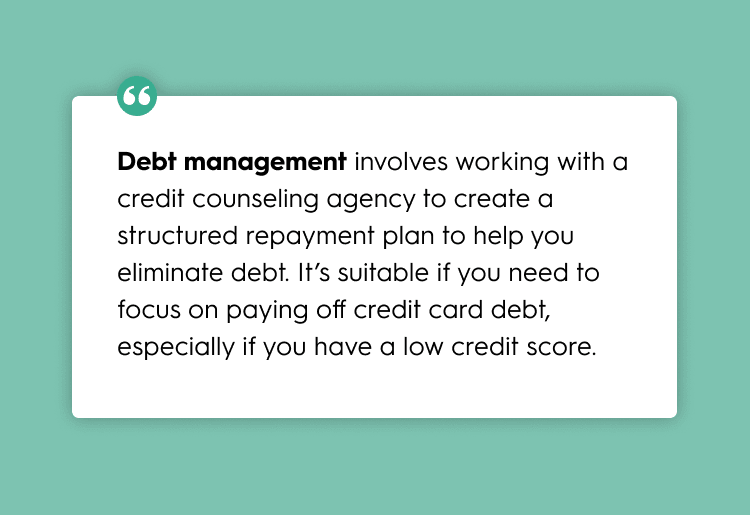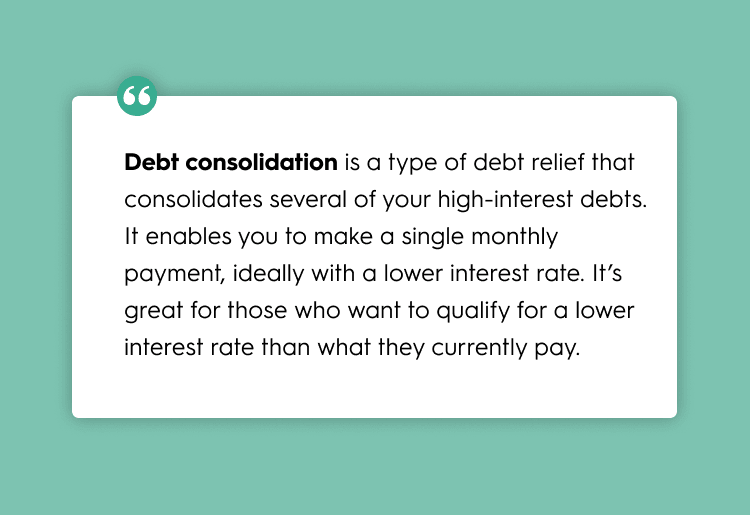
Debt management and debt consolidation are two widely used strategies for helping individuals manage excessive debt and regain financial stability.
Understanding the key differences between these two approaches is crucial to finding the right solution for your unique financial situation. Choosing the right strategy can make a significant difference in how quickly and efficiently you become debt-free.
In this guide, we’ll explore the concepts of debt management and debt consolidation, including their definitions, benefits, potential drawbacks, and who may benefit most from each approach. By the end, you’ll have a clearer understanding of which option may be the most appropriate fit for your financial goals.
What Is Debt Management?
Debt management, often referred to as a debt management plan (DMP), involves working with a credit counseling agency to create a structured repayment plan to help you eliminate debt. Debt management plans are primarily designed to address credit card debt and don’t typically cover other types of debt, such as student loans, personal loans, or medical bills.
Debt management is suitable for individuals who need to focus on paying off credit card debt but have too much debt to consolidate effectively. It’s also a good option for those whose credit score isn’t high enough to qualify for top debt consolidation products, like a debt consolidation loan or a balance transfer.

With a debt management plan, your credit card debts are consolidated into a single monthly payment, typically with a reduced interest rate. The repayment term generally lasts three to five years, during which you won’t be able to use credit cards or open new lines of credit.
One of the major advantages of a debt management plan is that you do not need to meet specific qualifications to be eligible, and your credit score is not a factor in whether you qualify. Even more so, a debt management plan can enforce the discipline needed to stop spending on credit accounts.
Debt Management Interest Rates
Your credit counseling agency will work with a creditor to determine an interest rate based on your ability to pay. If you’re considered a hardship case (with a credit score below 550), you may qualify for an interest rate as low as 0%-6%. But in most cases, you can expect to pay an interest rate of around 8% for a debt management plan.
In contrast, credit card interest rates typically range from 24% to 29.5% or even higher. According to the Federal Reserve, the average U.S. credit card interest rate in May 2024 was 22.76%. This means that a debt management interest rate of 8% or less is significantly lower than credit card interest rates.
Debt Management Fees
Debt management fees are based on the state laws where you reside. Generally speaking, though, you can expect to pay between $20 and $55 in monthly fees. Some agencies also charge a one-time set-up fee of around $75, although this can vary by state as well. Nonprofit credit counseling agencies may offer reduced fees or waivers based on financial hardship.
How Does a Debt Management Plan Affect Your Credit?
Debt management programs require you to stop using all but one credit card. Halting payments on your credit cards can temporarily cause your credit score to drop. However, as you begin to pay down your debts, your credit utilization will decrease, and your credit score will eventually improve.
What Is Debt Consolidation?
Often referred to as a debt consolidation loan, this type of debt relief consolidates several of your high-interest debts, often from credit cards. It enables you to make a single monthly payment, ideally with a lower interest rate.
There are a few ways to go about consolidating your debt, including taking out a home equity loan, a balance transfer credit card, a 401(k) loan, or a personal loan. Keep in mind that you’ll need a ‘good-excellent’ credit score to qualify for a balance transfer credit card or personal loan.
Debt consolidation is appropriate for those who want to qualify for a lower interest rate than what they currently pay and reduce the number of payments they have to make. It’s also a great option for those who want to maintain access to credit while paying off debt.

However, debt consolidation comes with several requirements, including:
Proof of income: The lender will want to ensure you’re financially stable enough to take on a new loan.
Credit history: The lender will use your credit score to determine your interest rate and look into your payment history.
Equity: If you take out a large loan, the lender may require you to put down collateral, such as home equity, to avoid financial risk.
Debt Consolidation Interest Rates
With a debt consolidation loan, your creditor will rely heavily on your credit score to determine your interest rate. If you have a credit score of 650 or higher, you can expect an interest rate of around 8% (or maybe even lower). If your credit score is below 650, your interest rate may jump into double digits. Credit scores below 580 will seldom be considered for a debt consolidation loan.
Debt Consolidation Fees
Instead of varying from state to state, debt consolidation fees vary from lender to lender. Most lenders will charge an origination fee, which usually amounts to 1%-8% of your monthly payment. Other potential fees may include late payment fees (generally $15-$30), insufficient fund fees (generally $15), and check processing fees (generally $7).
How Does Debt Consolidation Affect Your Credit?
With debt consolidation, you add another line of credit, which can negatively impact your credit score. However, if you stick to on-time payments for a minimum of six months, you may see your credit score gradually improve.
» Want to find another way to close your debt without impacting your credit? Read more about debt consolidation vs. debt settlement.
Debt Management vs. Debt Consolidation: What Are the Differences?
The goal of debt management and debt consolidation is the same—to regain control of debt, save money, and simplify your debt. However, debt management and debt consolidation employ different tactics for paying down debt.
Debt Consolidation:
This can be done independently by opening a new account, such as a personal loan or new line of credit.
Requires regular monthly installment payments toward the new loan or credit line.
With a balance transfer card, you choose how much to pay each month (at or above the minimum).
If you qualify for a 0% interest balance transfer card, paying off your debt during the promotional period can help you avoid interest charges.
Debt Management Plan (DMP):
No new loan is required. Instead, you work with a credit counseling agency to create a structured repayment plan.
Offered by nonprofit organizations at a low cost.
Your monthly payments go directly to the credit counseling agency, which makes payments to your creditors on your behalf.
In some cases, the agency only assists with the plan, and you remain responsible for making all monthly payments.
Pros and Cons of Debt Management
Before signing up for a debt management program, keep in mind the main pros and cons:
| Pros | Cons |
|---|---|
|
|
Pros and Cons of Debt Consolidation
Here are the pros and cons of debt consolidation to keep in mind:
| Pros | Cons |
|---|---|
|
|
Bottom Line
In conclusion, both debt management and debt consolidation offer valuable pathways to help regain control over overwhelming debt. Choosing the right approach depends on your unique financial situation. Debt management is great for those with primarily credit card debt and limited options due to credit score, while debt consolidation works for those seeking lower interest rates and streamlined payments. Understanding the pros, cons, and requirements of each strategy will enable you to make an informed decision and take a significant step toward financial freedom.




